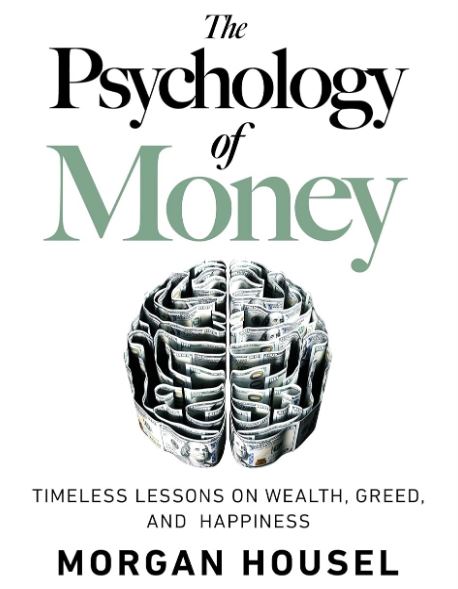The Psychology of Money by Morgan Housel challenges readers’ preconceived notions about wealth. It reads more like a behavioral guide than a technical manual, encouraging you to notice how social dynamics, emotions, and prior experiences subtly influence every financial choice you make. The book is remarkably good at telling its story without getting bogged down in charts or tactics. Rather, it serves as a mirror for our intuition, showing us how people with comparable incomes can lead radically different financial lives based on their actions rather than their intelligence.
The premise of the book is remarkably similar to lessons learned in the field of celebrity finance. Think about how some athletes, like Michael Jordan, made billions of dollars through careful licensing and investing, while other athletes with just as much talent went bankrupt soon after they retired. The difference is in mindset, not knowledge. These subtle yet potent forces are broken down by Housel’s insights, which are based on decades of data and observation. He advises readers to prioritize consistency, patience, and perspective over income levels or raw returns.
| Topic | Details |
|---|---|
| Book Title | The Psychology of Money |
| Author | Morgan Housel |
| Occupation | Financial Writer, Behavioral Finance Expert |
| Publisher | Harriman House |
| Publication Date | September 2020 |
| Core Themes | Luck vs. Risk, Compounding, Saving Habits, Time Control, Financial Behavior |
| Cultural Impact | Bestseller in over 30 countries, lauded by investors and behavioral economists |
| Reference Link | morganhousel.com |
Housel reinterprets success by emphasizing “time” as the commodity that money can purchase. He highlights that the greatest benefit that money can provide is the freedom to make choices without external pressure. The decisions made by artists such as Beyoncé, who famously declined multi-million dollar offers in favor of equity or complete control over her work, reflect this sentiment. Financial independence gives you the ability to say “no,” which is incredibly freeing and, as Housel points out, greatly underestimated.

Additionally, he warns against lifestyle inflation, which is the subtle trend of spending rising in tandem with income. Surprisingly, a lot of high earners make the mistake of confusing the signs of wealth with actual wealth. Expensive homes, rare cars, and exclusive club memberships can serve as costumes in Silicon Valley and Hollywood, giving the impression of security while undermining actual financial stability behind the scenes. Housel’s wisdom? What you can’t see is wealth. It’s the untaken trips, unpurchased vehicles, and unshared Instagram stories.
The idea of personal money blueprints is another particularly novel concept in the book. Housel contends that lived experience—what we witnessed our parents doing, how we felt during recessions, and even where we were raised—rather than reason, shapes our financial habits. This explains why two individuals with the same income may approach investing in very different ways. While one spends freely in search of fulfillment, the other saves obsessively out of fear of instability. Until we bring them to light, these scripts frequently operate in silence.
The magic of compounding becomes a major theme over time. However, Housel describes it as a philosophy rather than merely mentioning it in mathematical terms. Compounding takes time, and patience is a quality that is noticeably lacking. Although he calls the snowball effect of disciplined investing “the strongest force in finance,” it is rarely appreciated at the time. The way that celebrities like Warren Buffett amassed wealth gradually, covertly, and virtually imperceptibly—and then all at once—is reflected in this delay in gratification.
Throughout the book, caution and humility are valued more highly than boldness. He recounts the tale of Rajat Gupta, the former McKinsey CEO who was convicted of a crime, to demonstrate how even the most successful careers can be destroyed by a lack of “enough.” Compare that to Jeff Bezos, who, in the early days of Amazon, famously used a desk made out of a door despite becoming the richest man alive. In navigating long-term financial success, that mindset—which is based on restraint rather than showmanship—proves to be not only sustainable but also incredibly effective.
Here, too, long tails—a notion that is rarely explored in mainstream finance—are given due consideration. According to Housel, the majority of results are frequently the result of a small number of exceptional choices or occurrences. This holds true for popular movies, successful initial public offerings, and viral social media campaigns. Results can be drastically skewed by a single spectacular success, but most attempts may fail quietly. Accepting this reality entails taking regular minor losses without losing hope, a tactic that angel investors and even musicians who wager on unusual albums successfully employ.
The Psychology of Money is unique because it prioritizes reasonableness over perfection. Housel admits that a lot of people who are successful financially don’t use the same tactics as others. They adhere to those they can follow. In a culture where comparison is frequently the norm, this message is especially consoling. The temptation to change course is strong, whether it’s from a friend boasting about cryptocurrency gains or an influencer offering secrets to get rich quick. However, Housel points out that sticking to “boring” but sound plans—even when they don’t trend—is typically how sustainable wealth is created.
With relatable clarity, the statement that “money buys freedom, not stuff” is emphasized. This change in viewpoint can have a profound impact on professionals who have been burned out by unrelenting ambition. Instead of constantly pursuing the next promotion, it enables people to prioritize their relationships, sleep, or passion projects. Despite being less noticeable than a luxury vehicle, this balance yields benefits that are practically and emotionally irreplaceable.
These ideas have become remarkably apparent in the tech and entertainment industries in recent years. FIRE (Financial Independence, Retire Early) principles are becoming more and more popular among founders. To obtain creative control, actors and musicians are starting production companies. Influencers are starting passive income streams to buy back their time, not to show off their wealth. These changes, made possible by strategic foresight, exemplify Housel’s main contention: living fully on your own terms is more important than impressing others with what you have.
